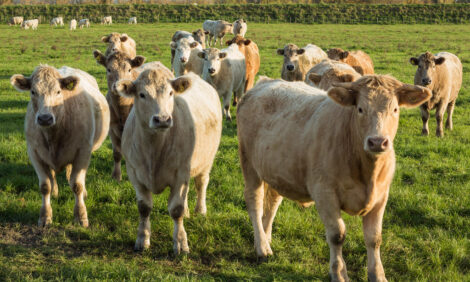



Canadian Farmers' Milking the Demand
MISSISSAUGA, ONTARIO - Strong growth in Canadian dairy product sales, positive action by the federal government on solutions to several industry issues and continuing concern about ongoing trade negotiations were among the highlights for dairy farmers in the last year, says Bruce Saunders, chair of Dairy Farmers of Ontario (DFO).In his address to the more than 600 people attending DFO's 42nd annual meeting, Saunders discussed these issues and a number of others the industry had faced during 2007.
Strong consumer demand grew sales by about four per cent making 2007 a good year for dairy farmers, Saunders said. He also pointed to a number of international trends that have made dairy markets stronger in the past year. "The world price is at record high levels for a number of reasons, including increased demand from Asian countries, principally China but including India and Vietnam, the on-going drought in Australia and the elimination of the stockpiles of surplus skim milk powder that existed in Europe and the United States."
* "It seems that most countries want to increase access to other countries but create a situation which will limit access to their own market." |
|
Bruce Saunders, chair of Dairy Farmers of Ontario (DFO)
|
Saunders praised the federal government for strong leadership and action on a number of fronts while highlighting two specific issues. The first was the launch of a WTO Article 28 action to put a tariff on the importation of Milk Protein Concentrates above the historical import level. "This is an ongoing process with consultations being held with the affected countries and ultimately volumes being assigned to those specific countries based on their historical exports," he said. The second initiative resulted in the announcement in December of cheese standards requested by the industry. These clear standards will ensure Canadians consistently get what they expect when it comes to the taste, texture and nutritional value of the cheese they buy anywhere in Canada.
The stability and growth achieved by Canada's dairy marketing system continues to face potential threats from the ongoing World Trade Organization (WTO) goal of lower tariffs and increased market access. "It seems that most countries want to increase access to other countries but create a situation which will limit access to their own market" Saunders said. "This is exactly what the European Union has done with its CAP program and the U.S. has done with its Farm Bill." For example, the U.S. Senate just passed $286 billion in farm subsidies in December, much of which they will designate as green programs that are exempt from WTO reduction, he added.
The Canadian government has remained firmly committed to getting a trade deal that will maintain the Canadian dairy and poultry marketing systems that have worked so well for farmers, processors and consumers. As recently as Jan. 4, Federal Agriculture Minister Gerry Ritz issued a statement confirming the Canadian government's firm resolve. "Canada continues to actively oppose any tariff quota expansion or tariff cuts for sensitive products and we continue to take a firm position on this issue," Ritz said. His statement reiterated that the Canadian government continues to support a WTO deal which recognizes the interests of all Canadian farm families while also saying, "This government has shown leadership in supporting supply management and the benefits it delivers to farm families."
While the Canadian position is clearly defined, the timeline for the potential conclusion of the negotiations is not and the WTO has a history of never meeting its own schedules. "With the U.S. elections this year and no fast-track authority, I believe the negotiations will slow down," Saunders said. "I also believe that this DOHA Round will finish with a deal likely in 2010 with implementation starting January 2011, with a five-year phase-in period."
In spite of the trade uncertainty, Saunders concluded that the dairy industry would remain a vibrant and positive part of the agricultural scene in 2008. "This is an industry to be proud of, an industry that is a recognized leader in the agricultural sector," he said. "For most of us last year, 2007, was a good year. Let's make 2008 even better."
TheCattleSite News Desk


